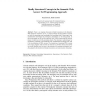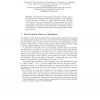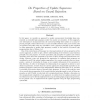19 search results - page 3 / 4 » Translating First-Order Causal Theories into Answer Set Prog... |
ESWS
2005
Springer
13 years 10 months ago
2005
Springer
There is an ongoing discussion whether reasoning in the Semantic Web should be monotonic or not. It seems however that the problem concerns not only the reasoning over knowledge bu...
ATAL
2010
Springer
13 years 5 months ago
2010
Springer
One of the most challenging aspects of reasoning, planning, and acting in a multi-agent domain is reasoning about what the agents know about the knowledge of their fellows, and to...
AI
2004
Springer
13 years 5 months ago
2004
Springer
We propose a new translation from normal logic programs with constraints under the answer set semantics to propositional logic. Given a normal logic program, we show that by addin...
CORR
2002
Springer
13 years 5 months ago
2002
Springer
Abstract. We implement Groenendijk and Stokhof's partition semantics of questions in a simple question answering algorithm. The algorithm is sound, complete, and based on tabl...
TPLP
2002
13 years 4 months ago
2002
In this paper, we consider an approach to update nonmonotonic knowledge bases represented as extended logic programs under the answer set semantics. In this approach, new informat...



